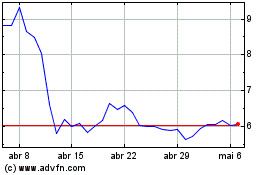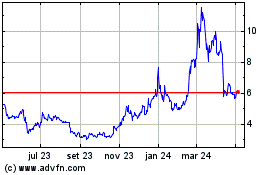Bitcoin ETFs in the US registered an inflow of $158.3 million on
Thursday
On September 19, Bitcoin ETFs saw a significant inflow of
$158.21 million, marking a strong recovery from the previous day’s
outflow of $52.7 million. The main contributors to this inflow were
the Ark 21Shares Bitcoin ETF (AMEX:ARKB), attracting $81.07
million, and the Fidelity Wise Origin Bitcoin Fund (AMEX:FBTC),
with $49.88 million. The BlackRock ETF (NASDAQ:IBIT) recorded its
third consecutive day of zero flows, while Grayscale (AMEX:GBTC)
experienced a slowdown in outflows.
Ether spot ETFs saw $5.24 million in net inflows yesterday,
exclusively from the BlackRock fund (NASDAQ:ETHA). Meanwhile, the
other eight funds showed no flows on Thursday.
Bitcoin nears key resistance of $65,000
On Friday afternoon, Bitcoin (COIN:BTCUSD) is down 0.4% in the
last 24 hours, trading at $62,700. The cryptocurrency’s price fell
alongside US stocks, with the S&P 500 and Nasdaq posting losses
of 0.25% and 0.43%, respectively. Popular traders believe Bitcoin
looks attractive, with low volume, as it approaches the $65,000
resistance. Analysts note that a weekly close above $64,000 could
signal a bullish breakout in the market structure, pushing for new
highs.
MicroStrategy buys 7,420 bitcoins with debt proceeds
MicroStrategy (NASDAQ:MSTR) purchased 7,420 bitcoins for $458.2
million between September 13 and 19, at an average price of $61,750
per BTC. The company expanded its convertible note issuance to
$1.01 billion, intended to fund additional BTC acquisitions.
MicroStrategy now holds 252,220 bitcoins, acquired at an average
cost of $39,266.
The complexity of cryptocurrencies hinders mass adoption
The technology behind cryptocurrencies and blockchain is
complex, deterring many ordinary users and hindering mass adoption.
Research indicates that a significant portion of people avoids
cryptocurrencies because they don’t understand how they work.
Experts suggest that the industry should simplify technical terms
and create more user-friendly interfaces, focusing on public
education. Additionally, the difficulty in securely storing digital
assets is another obstacle. Confusing regulatory environments also
increase user hesitation. Simplifying processes and offering
interactive learning experiences could make cryptocurrencies more
accessible, encouraging broader adoption.
Solana’s Seeker phone announcement boosts SOL
Solana developers announced that the network’s second phone, the
Seeker, will be released in 2025, boosting trading activity and
pushing SOL’s price (COIN:SOLUSD) to an intraday high of $152.41.
SOL is now up 2.4%, trading at $146.33, while Bitcoin shows a
slight decline. According to Beincrypto, if the strong bullish
momentum continues, SOL could break the $160 resistance and reach
$190; otherwise, it may retreat to $131.47.
Aptos rises with new strategic partnerships
Aptos (COIN:APTUSD) is up 5.14% at the time of writing, trading
at $7.16, standing out in the market. The increase was driven after
MEXC Ventures, Foresight Ventures, and Mirana Ventures created a
fund to support projects on the Aptos blockchain. This initiative
aims to accelerate the development of decentralized applications
and protocols using Aptos’ unique technology. The fund will also
support innovative solutions for critical challenges in the
blockchain community.
Aethir and Filecoin join forces to combat global GPU shortage
Aethir, a decentralized cloud computing network with GPUs, has
partnered with the Filecoin Foundation (COIN:FILUSD) to address the
global GPU shortage. Together, they offer integrated GPU rental
services with Filecoin’s decentralized storage, aiming to meet the
growing computational demands of the AI and Web3 sectors. The
collaboration seeks to balance computational power and data storage
in a decentralized manner, avoiding single points of failure and
improving GPU efficiency.
PancakeSwap launches v4 to enhance user experience and expand to
more networks
The decentralized exchange PancakeSwap (COIN:CAKEUSD) reported
$836 billion in accumulated trading volume and a total value locked
(TVL) of around $1.72 billion over four years, though it has
declined since its 2021 peak of $7.16 billion. To improve user
experience and scalability, PancakeSwap announced version v4,
aiming to address current AMM deficiencies, such as inflexible
pricing models and high gas fees. The update will offer dynamic
fees, advanced tools, and plans to expand its DEX to more
blockchains.
Judge dismisses Consensys lawsuit against SEC after Ethereum
investigation ends
Consensys sued the SEC for overreach due to the Ethereum
investigation. However, after the regulator ended the
investigation, a Texas judge ruled that the lawsuit was unnecessary
since there was no imminent threat to the company. The SEC ended
the “Ethereum 2.0” investigation, meeting Consensys’ demand, but
the company claimed the action raised concerns about SEC oversight
in the blockchain sector.
India’s Supreme Court YouTube channel hacked, shows Ripple videos
On Friday, the official YouTube channel of India’s Supreme Court
was hacked for the first time. The channel, which typically
livestreams court sessions, displayed videos promoting XRP tokens
(COIN:XRPUSD) and had its name changed to “Ripple.live24”. A fake
video titled “Brad Garlinghouse: Ripple responds to SEC’s $2
billion fine! XRP PRICE PREDICTION” aired. The channel and video
were taken down shortly after. The Supreme Court stated that the
channel would return soon.
Germany shuts down 47 crypto exchanges for facilitating criminal
activities
The German government closed 47 cryptocurrency exchanges,
accusing them of knowingly enabling an underground market that
benefits cybercriminals. Authorities allege that these platforms
facilitated the concealment of illicit funds’ origins, including
ransomware operations and black-market trades. While they seized
servers and user data, the government acknowledged the difficulty
in prosecuting all involved, especially those residing abroad.
Judiciary approves Terraform Labs bankruptcy after SEC settlement
Terraform Labs obtained judicial approval to end operations in
its bankruptcy proceedings after settling a case with the US
Securities and Exchange Commission (SEC), Reuters reported on
September 19. Judge Brendan Shannon deemed the bankruptcy plan in
Delaware a “welcome alternative” to avoid further litigation over
investor losses. The company agreed to pay $4.47 billion to the SEC
for frauds estimated at $40 billion. Co-founder Do Kwon is set to
contribute $110 million and transfer assets to compensate affected
investors.
Nexon integrates blockchain to transform online gaming with
MapleStory Universe
South Korean gaming giant Nexon announced the integration of
blockchain technology into MapleStory Universe, allowing the market
to control in-game assets. Keith Kim, head of strategy, emphasized
that this approach removes centralized control and creates a more
sustainable economy, giving players greater control over assets.
Additionally, the company launched its cryptocurrency NXPC for
in-game transactions.
Telegram’s Catizen token launched amid player dissatisfaction
Telegram’s play-to-earn game Catizen launched its CATI token for
trading after a two-month delay, distributing 150 million tokens
(15% of the total) to Season 1 users. Trading began on Friday on
exchanges like Binance, Bybit, and Bitget. However, players were
disappointed when token allocations were reduced before the
airdrop, with 9% diverted to the Binance Launchpool. Catizen has
over 39 million users and significant revenue, contributing to TON
blockchain’s rapid growth in users and transaction volume.
Filecoin (COIN:FILUSD)
Gráfico Histórico do Ativo
De Fev 2025 até Mar 2025

Filecoin (COIN:FILUSD)
Gráfico Histórico do Ativo
De Mar 2024 até Mar 2025
